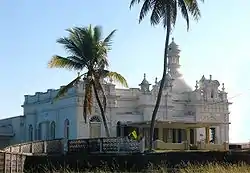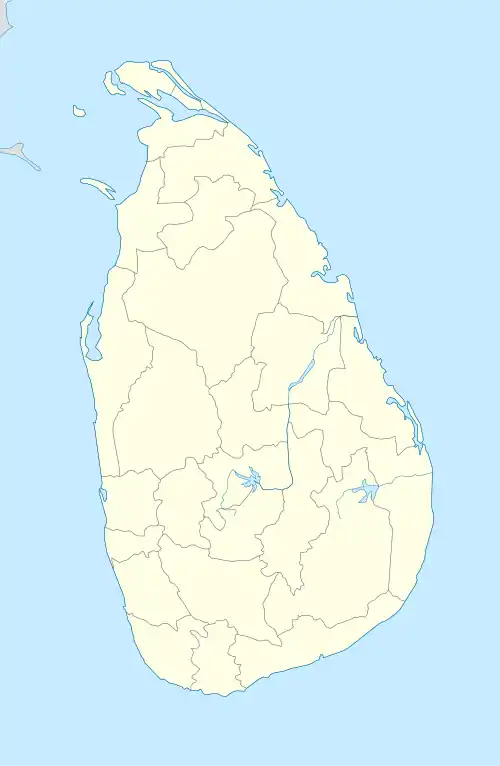Beruwala
Beruwala (Sinhala:බේරුවල Tamil: பேருவளை ) is a town in Kalutara District, Western Province, Sri Lanka, governed by an Urban Council. Beruwala with a total area of approximately 15 square kilometres and is located on the south-west coast of Sri Lanka, 60 km (37 mi) south of Colombo.[1]
Beruwala
බේරුවල பேருவளை | |
|---|---|
Town | |
 Kechchimalai Mosque, Beruwala (one of the oldest mosques in Sri Lanka) | |
 Beruwala Location in Sri Lanka | |
| Coordinates: 6°28′N 79°59′E | |
| Country | Sri Lanka |
| Province | Western Province |
| District | Kalutara District |
| Divisional Secretariat | Beruwala Division |
| Government | |
| • Type | Urban Council |
| • Chairman | Mazahim Mohamed |
| Population (2012) | |
| • Urban | 33,053 (Urban Area) |
| • Metro | 113,364 (Beruwala Division Area) |
| Time zone | UTC+5:30 (Sri Lanka Time) |
| Area code(s) | 034 |
Etymology
The name Beruwala is derived from the Sinhalese word for the place where the sail is lowered. It marks the spot for the first Muslim settlement on the island, established by the Somali Sheikh Yusuf bin Ahmad al-Kawneyn, who converted the people into Islam. The town was originally named Berbereen in honour and respect of the Somali Shaikh.[2] The Chinese also traded here and Beruwala was known to them as Piehlo-li.[3]
History
Yusuf bin Ahmad al-Kawneyn is also credited with establishing the first Sri Lankan Muslim settlement. Which marks the spot for the first Muslim settlement on the island, established by the Somali Sheikh Yusuf bin Ahmad al-Kawneyn, .[4][5]
Beruwala, according to some historians derived its name from two Sinhala words, viz. Be (lower) and Ruwala (sail), which denotes the place where the sails of the Arab merchant vessels were lowered. When the early Arab settlers arrived by sea and on sighting a tiny islet, they, overcome with joy, cried out "Berr..Berr.." to their oarsmen of the catamarans to stop. This island called "Barberyn" adds picturesque atmosphere to the environment to the area in the sea waters in which the Barberyn Light House is currently located.[6]
A significant contribution of the Arabs in Sri Lanka, the Unani medicine system, found its way to this country through Beruwala. Tradition has it that in the 10th century, Prince Jamal-ud-din, the son of the Sultan of Konya (in Asia Minor) arrived here and practised Unani medicine. Many Unani physicians have had the honor to serve the kings in the palace at that time. For instance, Muhandiram Mohamed Odeyar who belonged to the famous Behethge clan, served as a physician to the Kandyan monarchs and even the Princes of Maldives sailed to Ceylon (Sri Lanka) for treatment from the Unani physicians.[7]
Although the Unani medicine practice has declined significantly in Sri Lanka, quite a number of them could still be found practicing in various parts of the country, including in Beruwala. The grandfather of former Speaker of Parliament, Deshamanya Alhaj M.A. Bakeer Markar was an established Unani physician of the area. Muslims used the term "Hakeem" when referring to a physician, which means literally a person of wisdom in Arabic. The 'Hakeem Villa' in Beruwala still stands as a monument to this family of Physicians.[8]
The great philanthropist Alhaj M. I. M. Naleem, who rose to prominence through the gem trade, contributed much for the development of Islamic culture and tradition, the founding of the Islamic Institute, Jamiya Naleemiya [9] being one of them, following the footsteps of his distinguished immediate predecessors such as Alhaj N. D. H. Abdul Cafoor and E. L. Ibrahim Hajiar also known as "Rubber King" who have donated their wealth for the development of education and for the welfare of the disabled and orphans in Beruwala.[10]
Beruwala has also produced a Muslim Ruler by the name of "Vathimi Raja" who reigned in Kurunegala for a brief period during the 14th century.[11] He was the son of Buvanekabahu I, by a Muslim spouse from Beruwala. He is still remembered by the people of Kurunegala as Vathimi Deiyo or Gale Bandara Deiyo. There is also a Vattimirajapura Housing Scheme, which was fittingly opened by the late Alhaj M. A. Bakeer Markar and appropriately named in remembrance of the King Vathimi. As destined, when he was then Speaker, Alhaj M. A. Bakeer Markar too was the Acting Head of Sri Lanka for a brief period in 1981, when then President J. R. Jayewardene and Prime Minister Ranasinghe Premadasa left for England to attend a Royal Ceremony.[12]
Demographics
Beruwala is a Muslim majority town. Sinhalese are sizable minority.There is also small numbers of Tamils.
Ethnicity according to Beruwla Urban Area (2007)
Source:statistics.gov.lk
Attractions
- Beruwala has a large population of Sri Lankan Moors, many of them gem merchants, who still live in the town particularly in the China Fort and Maradana area.
- Ketchchimalai Mosque situated in Maradana is a significant landmark of the town and one of Sri Lanka's oldest mosques. It was constructed by Arab traders on a rocky peninsula overlooking the town.
- Galapata Temple - a Buddhist temple built in the 12th Century.
- Masjid Al Abrar situated in Beruwala it is the first Muslim Mosque of Sri Lanka built in 920 AD, presumably by Arab traders who frequented Sri Lanka by sea.[13]
Transport
Rail
The Beruwala railway station, is located on the Coastal Line, connecting Colombo to Matara.
Road
Beruwala is served by the A2 highway, which runs past the town.
Education
Beruwala is home to Al-Fasiyatul Nasriya Muslim Balika Navodaya School Maradana, which is the first and oldest Islamic girls school in Sri Lanka. It was damaged by the tsunami on Boxing Day 2004. As well as the First Islamic University of Sri Lanka "Jamiah Naleemiah" was established in Beruwela on 1974 by Great Donor Al-Haj Neleem for the betterment of Islamic Education in Muslim Society. It Consists of 7 years Islamic Syllabus as well as the Government curriculum. The library of Jamiah Naleemiah premises is known as The Largest Islamic Library of South Asia. Graduates of Naleemiah serve the country in various aspects such as in Public & Private sectors.
Government schools
- Al Fasiyathul Nasriya Ladies (Navodaya) College
- Naleem Hajiar Ladies College (Navodaya)
- Al Humaisara National School (boys)
- ZAM Refai Hajiar Maha Vidhyala
- ILM Samsudeen Maha Vidhyala
- DS Senanayake National School
- Ariyawansha Maha Vidyala
- Al Fasiyathul Nasriya Boys School
International schools
- Harrow International School
- Wisdom International School
- Golden Gate International School
University and colleges
- Jamiah Naleemiah Islamic University (1973) Founder - Al Hajj Marhoom Naleem
- Iqra Technical College Founder - Al Hajj Marhoom Naleem
International relations
See also
References
- Secretariat of the Convention on Biological Diversity (2007). Managing tourism & biodiversity: user's manual on the CBD guidelines on biodiversity and tourism development. Secretariat of the Convention on Biological Diversity. p. 63.
- Jaleel, Talib (8 July 2015). Notes On Entering Deen Completely: Islam as its followers know it. EDC Foundation. p. 1106.
- "Journal of the Sri Lanka Branch of the Royal Asiatic Society". 30–32. Sri Lanka Branch of the Royal Asiatic Society. 1985: 78. Cite journal requires
|journal=(help) - Galaal, Musa (1980). "Les liens historiques entre la corne de l'Afrique et les îles du golfe Persique et de l'océan Indien par les voies de l'Islam". Relations historiques à travers l'océan Indien. Belgique: l'Organisation des Nations Unies pour l'éducation, la science et la culture. p. 28. ISBN 978-92-3-201740-6.
Translated from French to English: Now this holy man - this is the new point (Al Kownayn) – seems to be the same as that which the people of the Maldive Islands, near India, called Barakath Al-Barbari who spread Islam in this region as he did in the Horn of Africa. We only know in which of these two regions he lived first and this prompted him to change sectors of business.The tomb of Sheik Barkhadle (Yusuf Al Kownayn) is in a ruined city called Dhogor, near Hargeisa, in the north of the Democratic Republic of Somalia.
- Honchell, Stephanie (2018), Sufis, Sea Monsters, and Miraculous Circumcisions: Comparative Conversion Narratives and Popular Memories of Islamization, Fairleigh Dickinson University and the University of Cape Town, p. 5,
In reference to Ibn Batuta's Moroccan theory of this figure, citation 8 of this text mentions, that other accounts identify Yusuf Al Barbari as East African or Persian. But as a fellow Maghribi, Ibn Battuta likely felt partial to the Moroccan version.
- http://www.worldgenweb.org/lkawgw/beruwela.htm
- http://www.worldgenweb.org/lkawgw/beruwela.htm
- http://www.worldgenweb.org/lkawgw/beruwela.htm
- https://naleemiah.edu.lk/
- http://www.worldgenweb.org/lkawgw/beruwela.htm
- http://www.worldgenweb.org/lkawgw/brihist.htm
- http://www.worldgenweb.org/lkawgw/beruwela.htm
- http://www.srilankamuslims.org/oldest-mosques-sri-lanka/
- "Reading - Town Twinning". Reading Borough Council. Archived from the original on 9 May 2013. Retrieved 14 July 2013.
